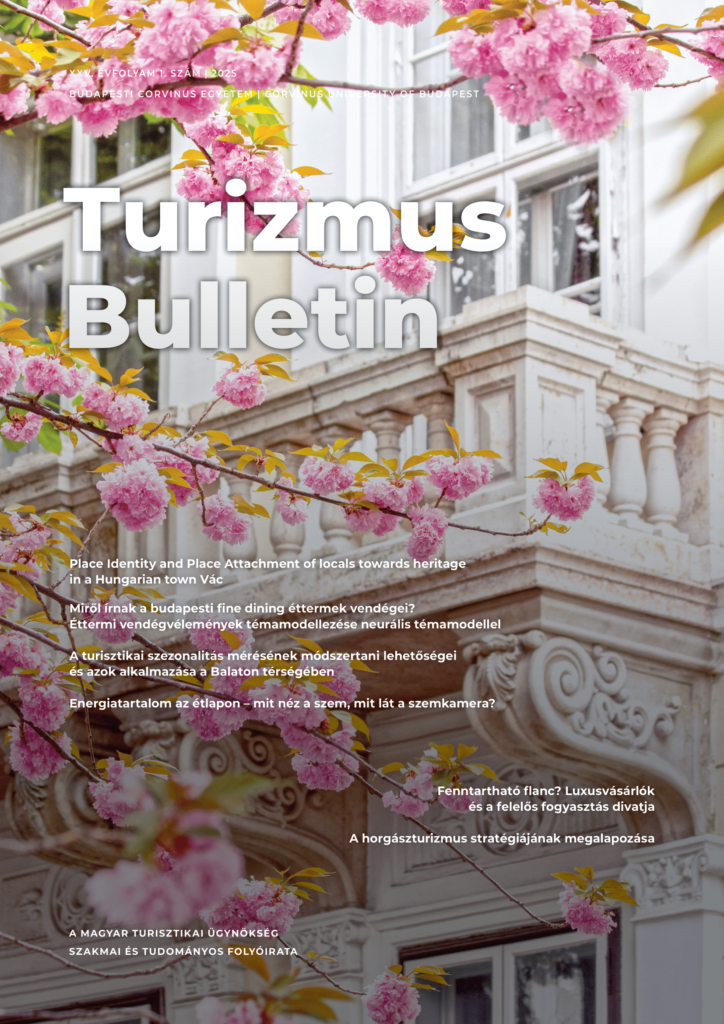Fenntartható flanc? Luxusvásárlók és a felelős fogyasztás divatja
DOI:
https://doi.org/10.14267/TURBULL.2025v25n1.5Kulcsszavak:
luxus, fenntarthatóság, attitűd-skála, luxusfogyasztóAbsztrakt
A tanulmány a fenntartható luxus és a luxusfogyasztók fenntarthatósággal kapcsolatos attitűdjének vizsgálatára fókuszál. A luxus és a fenntarthatóság fogalma kapcsolatának áttekintése mellett bemutatásra kerülnek olyan jó gyakorlatok is, melyek azt bizonyítják, hogy a luxusmárkák számára is fontos a fenntarthatóság. A kapcsolódó kvantitatív kutatás keretében a szerzők a luxusfogyasztók fenntarthatósági attitűdjét és vásárlási szokásait mérték fel. Az eredmények szerint a luxusfogyasztók körében általánosságban pozitív hozzáállás jellemző a fenntarthatósággal kapcsolatban, ami megjelenik a használt termékek vásárlásában és a hosszútávú használatban egyaránt. A tanulmány fő következtetése, hogy a luxusmárkák bátrabban építhetnek a fenntarthatóság kommunikációjára, mivel a vásárlók oldaláról ez nemcsak divatkérdés, hanem valós igény is.
Hivatkozások
ACHABOU, M. A. – DEKHILI, S. (2013): Luxury and sustainable development: Is there a match? Journal of Business Research. 66(10). pp. 1896–1903. https://doi.org/10.1016/j.jbusres.2013.02.011
AGGARWAL, E. – SINGH, A. B. – MISRA, R. (2024): Does consumption values and ascribed responsibility predict attitudes towards sustainable luxury brands. Journal of Consumer Marketing. 41(2). pp. 180–195. https://doi. org/10.1108/JCM-05-2023-6058
AKROUT, H. – GUERCINI, S. (2022): Sustainability in fashion and luxury marketing: Results, paradoxes and potentialities. Journal of Global Fashion Marketing. 13(2). pp. 91–100. https://doi. org/10.1080/20932685.2021.2017320
ALGHANIM, S. – NDUBISI, N. O. (2022): The Paradox of Sustainability and Luxury Consumption: The Role of Value Perceptions and Consumer Income. Sustainability. 14(22). 14694. https://doi.org/10.3390/su142214694
AMATULLI, C. – DE ANGELIS, M. – DONATO, C. (2021): The atypicality of sustainable luxury products. Psychology & Marketing. 38(11). pp. 1990–2005. https://doi.org/10.1002/mar.21559
ARRIBAS-IBAR, M. – NYLUND, P. A. – BREM, A. (2022): Circular business models in the luxury fashion industry: Toward an ecosystemic dominant design? Current Opinion in Green and Sustainable Chemistry. 37. 100673. https://doi. org/10.1016/j.cogsc.2022.100673
BIASUTTI, M. – FRATE, S. (2017): A validity and reliability study of the Attitudes toward Sustainable Development scale. Environmental Education Research. 23(2). pp. 214–230. https:// doi.org/10.1080/13504622.2016.1146660
CHANDIRAN, G. K. (2021): Luxury branding: What it takes to be recognised as a luxury brand? MSc Dissertation. Bournemouth University, United Kingdom.
CHANG, W.-Y. – TAECHARUNGROJ, V. – KAPASUWAN, S. (2022): Sustainable Luxury Consumers’ Preferences and Segments: Conjoint and Cluster Analyses. Sustainability. 14(15). 9551. https://doi.org/10.3390/su14159551
DEVANATHAN, S. (2023): Tracing the Characteristics and Consequences of Luxury Through a Review of Literature. International Journal of Professional Business Review. 8(11). e03870, pp. 1–20. https://doi.org/10.26668/ businessreview/2023.v8i11.3870
DIJKSTRA, E. M. – GOEDHART, M. J. (2012): Development and Validation of the ACSI: Measuring Students’ Science Attitudes, Pro Environmental Behaviour, Climate Change Attitudes and Knowledge. Environmental Education Research. 18(6). pp. 733–749. https:// doi.org/10.1080/13504622.2012.662213
GUMMERUS, J. – VON KOSKULL, C. – KAUPPINEN-RÄISÄNEN, H. – MEDBERG, G. (2023): Who creates luxury? Unveiling the essence of luxury creation through three perspectives: A scoping review. Qualitative Market Research. 27(2). pp. 180–211. https://doi. org/10.1108/QMR-02-2023-0025
HOLMQVIST, J. – WIRTZ, J. – ISSANDOU, A. (2023): Research Note: Conceptualizing Agentic Luxury in Luxury Services. Journal of Services Marketing. 37(9). pp. 1113–1119. https://doi. org/10.1108/JSM-07-2023-0283
KUNZ, J. – MAY, S. – SCHMIDT, H. J. (2020): Sustainable luxury: Current status and perspectives for future research. Business Research. 13(2). pp. 541–601. https://doi. org/10.1007/s40685-020-00111-3
LUMING, Z. – PENG, J. – YU, S. L. (2023): Sustainable Luxury and Consumer Purchase Intention: A Systematic Literature Review. SAGE Open. 13(4). https://doi.org/10.1177/21582440231216285
SESTINO, A. – AMATULLI, C. – DE ANGELIS, M. (2021): Consumers’ Attitudes Toward Sustainable Luxury Products: The Role of Perceived Uniqueness and Conspicuous Consumption Orientation. In: Gardetti, M. Á. – Muthu, S. S. (eds): Handloom Sustainability and Culture. Springer Nature Singapore. pp. 267–279. https:// doi.org/10.1007/978-981-16-5967-6_12
VEBLEN, T. (1975): A dologtalan osztály elmélete. Közgazdasági és Jogi Könyvkiadó, Budapest.
YANG, H. – SU, X. – SHION, K. (2023): Sustainable luxury purchase behavior in the Post-Pandemic Era: A grounded theory study in China. Frontiers in Psychology. 14. 1260537. https://doi. org/10.3389/fpsyg.2023.1260537
ZWICKLE, A. – JONES, K. (2018): Sustainability Knowledge and Attitudes – Assessing Latent Constructs. In: Filho, W. L. – Marans, R. W. – Callewaert, J. (eds): Handbook of Sustainability and Social Science Research, World Sustainability Series. pp. 435–451. https://doi.org/10.1007/978- 3-319-67122-2_25

